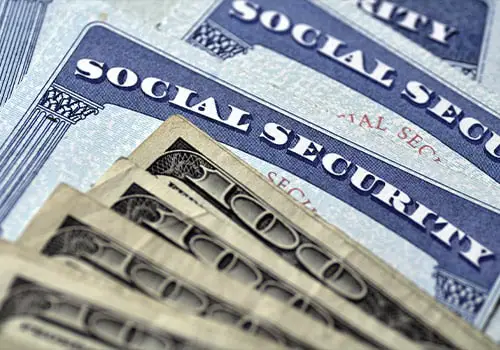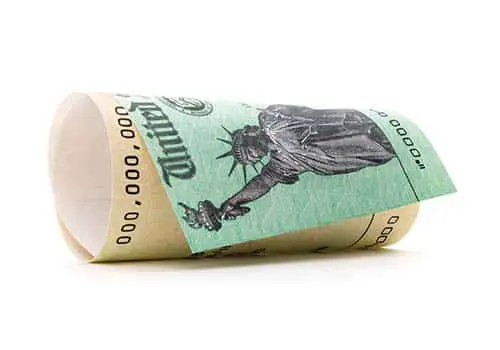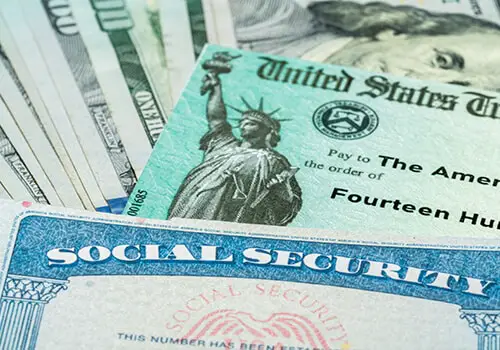Tax season can be stressful for many individuals. While many people look forward to getting a tax refund when they file their tax returns, some are stuck paying a big tax bill at the end of the year.
If you owe the IRS money, it is usually due by the April 15 tax deadline. You might wonder how you will come up with the money to make that big tax payment.
Perhaps you wonder, “Can I pay my taxes with a credit card?” You might be hoping to do this to earn points on your credit card or simply because you don’t have the cash to pay.
Whatever your reason, we’ll tell you everything you need to know about paying your income taxes with a credit card.
Can You Pay Taxes With A Credit Card?
Yes, you can generally pay your taxes with a credit or debit card. Whether or not you should take this route depends on your situation.
We’ll discuss that in more detail later in this article. However, here are the details on using a credit card to pay when you file your taxes.
Note that there are differences between paying your federal taxes with a credit card and paying your state income taxes with a credit card.
Paying The IRS
Yes, you can pay the Internal Revenue Service with a credit or debit card. The process is extremely easy, although there are some limits on the number of payments that can be made.
All you need to do is visit the IRS payment page on the IRS website. You can make many different types of tax payments through the payment page.
Remember that the IRS collects income taxes, death taxes, and many other types of tax payments. Payments of more than $100,000 come with special rules, and you should know that making these payments is not free.
Credit card payments must be made using one of the payment processors approved by the IRS. Each processor charges processing fees, which vary by processor. Employer-deposited tax withholdings cannot be paid using a credit card.
Paying State Taxes
You can pay the IRS online with your credit card, but can you pay your state taxes using that card as well?
It depends on where you live, as the rules vary from state to state. Many states can now accept online payments using a credit card, and some can also accept these payments over the phone.
Payment processors in different states charge different processing fees, so the cost of using your credit card will vary depending on your specific state.
KEY TAKEAWAYS
- You can pay your IRS taxes with a credit card, and the payment process is relatively easy using the vendors designated by the IRS.
- Most states also allow you to pay taxes with a credit card; however, they may use different credit card processing agencies.
- The fees associated with paying your taxes with a credit card are steep and average around 2%.
Fees For Paying Taxes With A Credit Card
We’ve already mentioned that paying your taxes with a card will cost you some money. Since the IRS must receive the full amount of your payment, you will need to cover the cost of the payment processing fees charged by the processors.
You might also hear this called the convenience fee. The IRS has three approved processors, and the fees vary between them. The one you should select depends on what type of card you wish to use and how much the payment will be. Here are the fees associated with each processor.
-
ACI Payments, Inc
This processor charges a fee of 1.98% for credit card payments, with a minimum fee of $2.50. If you are paying by debit card, the fee will be $2.20. This vendor accepts many different types of cards, including Visa, Mastercard, Discover, American Express, STAR, Pulse, PayPal, NYCE, and others.
-
Pay1040
If you select this vendor, your fee will be 1.87% of the payment amount for credit cards, with a minimum fee of $2.50. If using a consumer or personal debit card, the fee is only $2.50. For other debit cards, the fee is 1.87% of the payment amount. Pay1040 accepts all the major card types, including Visa, Mastercard, Discover, American Express, Click To Pay, STAR, Pulse, and others.
-
payUSAtax
The final IRS-approved processor charges a fee of 1.85% for credit card payments, with a minimum fee of $2.69. For debit cards, the fee is only $2.20. While this vendor does not accept as many types of payments as the others, payUSAtax accepts cards from all the major credit card issuers.
When paying your state taxes, the transaction fees will vary depending on your state. Each state that offers credit card payments uses different third-party payment processors.
For this reason, the fees will vary. However, they are generally about the same as the fees charged by the IRS payment processors.
Must read articles related to Taxes
- What are the benefits of married filing separate?
- Are you required to file taxes?
- How long should you keep tax returns?
- Check the status of your state refund.
- The ins and outs of OASDI tax.
Benefits Of Using A Credit Card To Pay Taxes
Even though you will incur an additional fee to make a credit card payment for your taxes, there are several reasons why you might choose to do so. Using your credit card for your tax payment could have much more significant benefits than the associated fee.
So, why would you want to pay your taxes with your card? Here are some of the most common benefits you might see:
Welcome Bonus Offer
Many credit card offers try to entice you to sign up for a new card by offering a great welcome bonus. This means that you will receive a sign-up bonus when you spend a certain amount of money on your card within a certain time period.
For instance, you might receive 50,000 bonus points for spending $5,000 within the first year of opening the card. Charging your tax bill to your credit card can help you meet these spending requirements quickly and easily.
However, you should ensure that the bonus you receive outweighs the fee you will be charged. Make sure that those bonus points or cashback rewards are worth more than the fee you’ll be charged for making the payment with a card.
Score Big Points & Rewards
Most people today utilize credit cards that offer rewards points or cashback offers. These benefits can help you earn free travel, extra cash, or other rewards for making purchases with your card.
By paying your taxes with a credit card, you might earn many reward points in one big chunk. This is especially true if you have a big tax bill. However, you will again want to ensure that the value of the rewards you receive is higher than the fee you are charged.
Meet Spending Thresholds
Some credit cards might require an annual spending threshold to avoid an annual fee on your card account.
Similarly, you might need to meet a certain threshold to gain silver or gold travel status. Whatever your need, using your credit card to pay your income taxes can help quickly put you over this threshold.
This can be a great payment option for someone who wants to meet their spending threshold soon without worrying about it for the rest of the year.
No Interest Offers
Many credit cards offer great offers to new customers, including a specific period without paying interest on your card balance.
Though you might be able to set up an IRS payment plan for your taxes, it will likely be much easier to pay the IRS with a credit card for the full amount. You can then make payments to your credit card company each month, and you will not owe any interest on the balance if you qualify for one of these offers.
This can be a great way to spread out your payments over 6 or 12 months without incurring interest charges.
Convenience
You might decide to pay your taxes with a credit card out of sheer convenience. You could print your paper tax returns and mail them to the IRS with a check. However, this takes a lot of time and effort. Plus, that payment could get lost in the mail and never make it to the IRS.
So, many people choose to make their payments with a credit card because it is so easy. The payment is immediate, and you get an electronic receipt showing that the payment was made. This is a quick and easy way to make your payments to the IRS.
Drawbacks Of Paying Your Tax Bill With A Credit Card
While paying your tax bill with a credit card can have some great benefits, there can also be some significant drawbacks. It could cost you a lot more money over time, and it could even hurt your credit score. Here are some of the most significant disadvantages of using your credit card to pay your taxes.
Additional Fees
This is probably the most obvious drawback of using your card to pay taxes. The bottom line is that it will cost you more money. You must pay those processing fees on top of your tax bill.
This could be a significant amount of money, depending on how large your tax bill is. Remember that those fees average about 2.5%. This means it would cost you an extra $250 to pay a $10,000 tax bill. If you are not receiving a credit card reward that makes it worth it, then this additional fee might cause you to rethink your credit card payment.
Long-Term Debt
Long-term debt can be a huge drawback to paying taxes with a credit card. You could end up making payments on that bill for years to come. Since some credit card interest rates can be as high as 25% or more, it might take years to pay off the debt.
Plus, having a large balance on your credit card will lower your credit score. This means that you will likely pay more for credit if you need to get a car loan or a mortgage. You should generally only place your tax bill on a credit card if you can pay off the amount quickly.
Interest Costs
As mentioned in the previous section, the interest costs of putting your tax bill on a credit card could be huge. In fact, depending on how much your tax bill is, it could cost you several thousand dollars in interest.
Plus, those big interest fees can make it seem almost impossible to pay off the balance. If you want to avoid interest fees, make sure you pay off the balance quickly before you start accruing interest.
Expiration Of Low-Interest Offers
Many people use a credit card to make their tax payments because of a low-interest offer from their credit card company.
However, remember that these offers will eventually expire. Some cards might offer a 6-month or 12-month no-interest period as an introductory offer. However, at the end of the special offer period, the interest rate will return to the regular rate.
This means that you will start paying high-interest charges. You should do everything possible to pay off your credit card balance before the low-interest offer expires.
TIP
You should weigh the pros and cons of paying your taxes with a credit card. The fees are expensive, so you’ll want to ensure the benefits outweigh the extra costs.
Best Credit Cards To Use For Tax Payments
Now that you have decided to use a credit card for your tax payment, which is the best? Many great rewards credit cards offer amazing rewards and sign-up bonuses. However, here are some of the best ones for taxpayers to use for their tax bills.

The VentureOne Rewards card from Capital One is an excellent option for your tax bill. This card allows you to earn unlimited 1.25 miles per dollar on every purchase, including your tax payments. Plus, the card has no annual fee and no foreign transaction fees. If you love to travel, this card is an excellent option for using your tax payments to earn miles that can be redeemed for travel rewards. You can earn a 20,000-mile bonus by spending $500 in the first three months.

This can be a great option for those looking to pay tax bills without interest. The Diamond Preferred card from Citi has a great introductory interest rate offer on purchases and balance transfers. Plus, it comes with no annual fee and competitive long-term interest rates. Check the card’s installment agreement to know what terms apply and what you’ll be required to pay once the promotional period expires. The card usually comes with a variable APR that changes based on the prime interest rate set by the Federal Reserve.

This great rewards card can be used to redeem points for travel, cashback, or other things. This card has an amazing sign-up bonus of 60,000 points when you meet the spending threshold during your first three months from the account opening date. Plus, when you redeem points for travel through the Chase Ultimate Rewards website, you get an additional bonus on your points. Your points are worth even more when you take that redemption route. Though the card does have an annual fee of $95, the features and benefits of the card tend to outweigh the nominal annual fee.
Other Tax Payment Options
Sure, you can pay your taxes with a credit or debit card, but what other options do you have?
- The classic method of mailing a check to the IRS with your return has existed for many years and is still available today.
- Many people choose to e-file their taxes today, and several electronic payment options can be utilized when filing your taxes electronically. Some tax preparers, like TurboTax, allow you to make credit card payments through their platform.
- However, the fees are often higher than those associated with making your payment directly through one of the IRS processors.
- You can also make a payment via electronic check or ACH. This will allow the IRS to deduct the payment directly from your bank account. There is no fee associated with this payment method.
- Some payment processors will accept other payment methods, like PayPal. The fees for using a payment service such as PayPal are usually the same as those for using a credit card.
As you can see, there are many different ways that you can pay your tax bill with the IRS. Select the one that makes the most sense for you and ensure your payment is on time to avoid any late penalties.
How To Decide Whether To Pay Taxes With A Credit Card
As we just mentioned, there are many other ways to pay your taxes besides a credit card. So, how do you decide whether to use a card for your payment?
It will depend on your financial situation. If you do not have the money to pay your tax bill, you might consider setting up a payment plan with the IRS instead of using a credit card. Even if your credit limit is high enough, using a credit card would likely cost you much more in interest.
However, you could also weigh the benefit of any rewards you might earn from your credit card. It might make more sense to use your credit card for the payment and then pay the balance off in full immediately.
You need to perform some calculations to determine whether using the card will result in a bigger benefit than the cost of the processing fees. If the benefit is larger, then go ahead and use your card to make the payment and enjoy the rewards you receive.
The Bottom Line
You can use a credit card to pay your Federal taxes to the IRS, and many states will also accept credit card payments for state taxes.
There are processing fees associated with using a card, though. However, many people still choose to use a card because of the rewards they can receive from credit cards. These rewards often greatly outweigh the cost of the processing fee.
If you decide not to use a credit card, you can also use a check, debit card, or automatic bank withdrawal. The IRS offers many different ways to pay your tax bill, so select the one that makes the most sense for your situation.
Depending on your situation, you may not owe a tax bill! Perhaps you receive Social Security benefits, and your Social Security benefits are not fully taxable. You can always seek the advice of a trusted accountant if you need help making this decision.
Frequently Asked Questions
Paying taxes with a credit card is a good idea for some people but not others. Whether or not it is a good idea depends on your personal situation.
If the amount of your tax bill will lead to long-term debt and interest payments, then it is likely not a good idea.
However, if using your credit card will lead to a large sum of credit card rewards, then it is likely a good idea. You should look closely at your personal financial situation and the terms of your credit card to determine whether it is the right choice for you.
The processing fees associated with a debit card are generally much lower than credit card processing fees.
However, most debit cards do not offer the same rewards as credit cards, and most credit cards have much better rewards programs than debit cards.
Therefore, the rewards you gain from using the credit card might make the processing fee worth it.
If you do not pay off the balance within your credit card’s grace period, you will owe interest on the balance.
Most credit cards include a grace period of approximately 20 days. During this period, no interest will accrue on new purchases.
If you pay off the balance within this time, you will not pay interest on the tax bill you pay with your credit card. However, if the balance remains after the expiration of the grace period, interest will begin to accrue.
The IRS offers many different ways for you to pay your taxes. You can pay Federal taxes online with a credit card, but that is only one of the ways to pay the IRS.
You might also pay with a debit card or through an ACH withdrawal from your bank account. Mailing the IRS a check is also an option.
If you do not have the money to pay your bill in full, you can potentially set up a payment plan with the IRS. You can visit IRS.gov to find all the different ways to pay your tax bill.
You can find a Social Security Administration office near you by using our SSA office locator and searching for your closest location.





